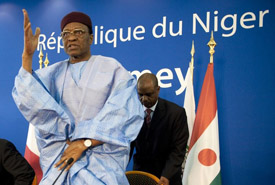In Niger today, the government is holding a public referendum on a constitutional amendment that would pave the way for President Mamadou Tandja to run for office indefinitely. It would also further increase the former army colonel’s control over the press. Tandja, at left, has charged ahead with the referendum despite overwhelming public opposition after he dissolved a resistant constitutional court and the National Assembly.
In response to increasing criticism from the press, he granted the head of the official media regulatory agency sweeping powers of censorship in June. The Niger Association of Independent Press Editors, which comprises 60 newspapers, 23 radio stations, and four television stations across the country, reacted by launching a weeklong strike in protest on July 20.
Article 130 of the new constitution would allow the president to handpick four of the seven members of the High Council on Communications. The communications minister (and government spokesman) and the speakers of the National Assembly and Senate designate the other three members. In contrast, the current 11-member council counts five political appointees with six members from the press and civil society.
For years, the council has suspended media outlets for critical coverage of sensitive topics, including the constitutional amendment. In June, for example, it banned live programming discussing Niger’s political crisis. Later that month, High Council President Daouda Diallo unilaterally and summarily banned Dounia Television and Radio after the network broadcast an opposition political statement. In an extraordinary twist, the move prompted six of the council’s members to publicly dissent with Diallo’s ruling on procedural grounds.
Under the proposed restructuring of the constitution, the media will suffer, journalists have told CPJ. “We are certain that many press outlets will be closed,” said local editor Boubacar Diallo. “The die is cast.”
Despite the critical issue at stake in today’s referendum, Diallo and many other journalists I spoke with said they boycotted the vote, citing a ruling of the now-defunct constitutional court declaring the poll illegal. “For us, it’s a non-event,” said Editor-in-Chief Ayouba Karimou of the weekly Opinions.
General turnout for the vote in the capital, Niamey, was low by all accounts, as many Nigeriens heeded an opposition call for a boycott, according to local journalists. Ali Idrissa, deputy director-general of Dounia, said the station refrained from interviewing boycotters after the president of the council and a spokesman of the Interior Ministry forbid the station on Saturday from doing so.
The situation for journalists in Niger has been deteriorating for a while now. Journalists are anxious over ongoing criminal prosecutions for reporting on government corruption.
Weekly L’Evènement Editor Moussa Aksar was in Niamey’s main police station today to sign a statement from a police interrogation on Saturday. Aksar was among eight editors police questioned about their coverage of a leaked document purporting to show that profits from Niger’s uranium mining went to the president’s son. Dounia Director General Abibou Garba is facing criminal charges of defamation and broadcasting false news for airing a television debate in April in which an activist described a uranium exploitation deal between French nuclear energy giant AREVA and the government as “looting of Niger’s resources.”
Nevertheless, the private Nigerien press regularly reports allegations of misuse of public funds, and some of the media’s investigations have been vindicated, even at the price of imprisonment. In 2006, for instance, journalists Maman Abou and Oumarou Keita of the biweekly Le Républicain broke a scandal in education financing, which eventually led to the sacking of two ministers, but not before serving four months of an 18-month prison sentence that was later overturned.
